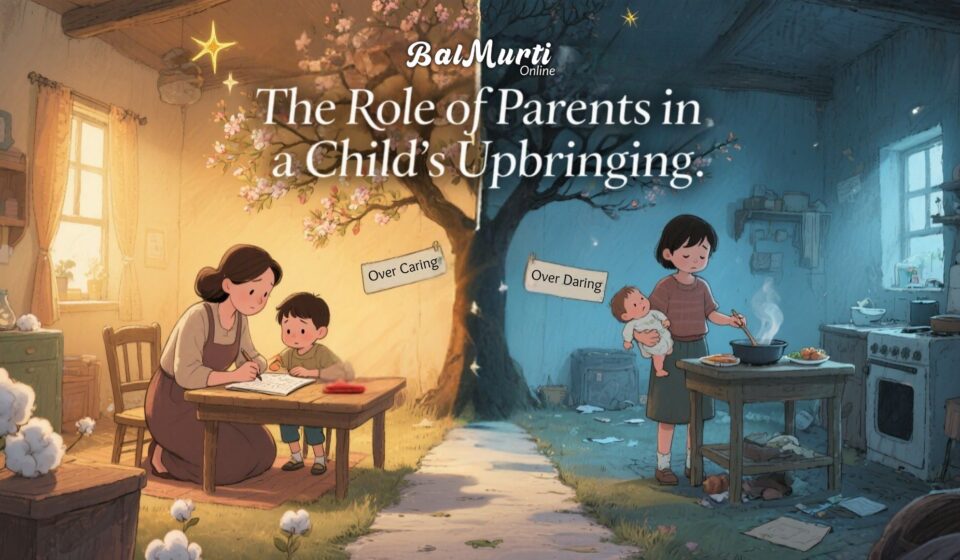
The Role of Parents in a Child’s Upbringing

I want to talk about parents. Parents are emotionally attached to their children. Every parent showers immense love upon their children. The love of a parent is sacred and pure like the holy Ganga. A mother’s affection is serene, constant, and deep, while a father’s care holds the strength of a mountain.
Wherever I go, I’ve observed that children in villages face more difficulties with their parents than children in cities. Still, even in cities, children suffer from parental challenges. Parents from villages and cities can be broadly classified into two types:
- Over-caring parents
- Over-daring parents
Over-caring Parents

Over-caring parents are those who, out of excessive affection, micromanage every small detail of their child’s life. These are the ones who finish homework for the children so they won’t be stressed. They even make the school projects themselves. This kind of parenting leads to unhealthy dependency. The child doesn’t get to develop confidence or life skills. They remain hesitant and unsure. Even in college, such children cannot manage responsibilities independently and constantly look for help.
Such over-caring limits a child’s emotional intelligence and damages their coping ability. Parents must understand that unless a child experiences struggle, they will not develop practical understanding or resilience.
Over-daring Parents

Over-daring parents are often from rural backgrounds. Most of them have faced poverty. For them, children are meant to work, earn, and contribute. When parents go out for labor, they often leave children in charge of the house. Such children end up taking care of younger siblings, managing chores, even making meals. These over-daring parents have no time or energy left for nurturing conversations or emotional connection.
These parents don’t worry about school or education either. They believe schools are enough to teach everything. They don’t pay attention to their child’s interests or needs. Because of this lack of involvement, children grow up emotionally neglected, missing the warmth of home.
Such children may develop talents, but without appreciation or encouragement, they remain hidden. They don’t shine. Children need a space where they are seen and celebrated. A child who paints well, sings beautifully, or speaks confidently won’t flourish without parental support.

We need a parenting model that understands and balances emotional and practical needs. Parents should become their child’s cheerleader. They should know when to guide and when to step back. There is no perfect parenting formula—but consistent encouragement and empathy can go a long way.
If we want to help children thrive, we must stop trying to turn them into someone else. Instead, help them discover who they already are.

Parents sometimes unknowingly suppress their child’s identity by trying to mold them according to their own image or ambition. We hear parents say, “Why can’t you be more like your cousin?” or “Why can’t you score like Sharmaji’s son?” This comparison culture needs to end.

Every child is unique. A child may not become a lawyer or doctor, but if they are supported well, they may shine as an artist, a sportsperson, or an entrepreneur.
Let them bloom in their own way.
My dear children,
May your lives blossom like lotuses,
And may your footsteps bring light to the world.
Disclaimer:
This article reflects the author’s personal insights and reflections. It is shared with the intention of encouraging thoughtful parenting and generational harmony. The project and foundation are acknowledged as part of the original source for transparency and integrity.




